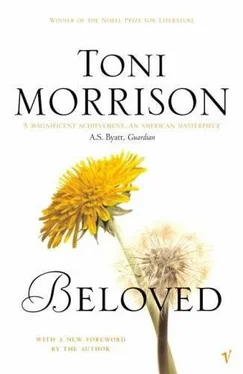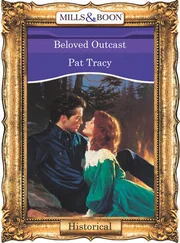Exhausted finally they lay down on their backs to recover breath.
The sky above them was another country. Winter stars, close enough to lick, had come out before sunset. For a moment, looking up, Sethe entered the perfect peace they offered. Then Denver stood up and tried for a long, independent glide. The tip of her single skate hit an ice bump, and as she fell, the flapping of her arms was so wild and hopeless that all three-Sethe, Beloved and Denver herself-laughed till they coughed. Sethe rose to her hands and knees, laughter still shaking her chest, making her eyes wet. She stayed that way for a while, on all fours. But when her laughter died, the tears did not and it was some time before Beloved or Denver knew the difference. When they did they touched her lightly on the shoulders.
Walking back through the woods, Sethe put an arm around each girl at her side. Both of them had an arm around her waist. Making their way over hard snow, they stumbled and had to hold on tight, but nobody saw them fall.
Inside the house they found out they were cold. They took off their shoes, wet stockings, and put on dry woolen ones. Denver fed the fire. Sethe warmed a pan of milk and stirred cane syrup and vanilla into it. Wrapped in quilts and blankets before the cooking stove, they drank, wiped their noses, and drank again.
"We could roast some taters," said Denver.
"Tomorrow," said Sethe. "Time to sleep."
She poured them each a bit more of the hot sweet milk. The stovefire roared.
"You finished with your eyes?" asked Beloved.
Sethe smiled. "Yes, I'm finished with my eyes. Drink up. Time for bed."
But none of them wanted to leave the warmth of the blankets, the fire and the cups for the chill of an unheated bed. They went on sipping and watching the fire.
When the click came Sethe didn't know what it was. Afterward it was clear as daylight that the click came at the very beginning- a beat, almost, before it started; before she heard three notes; before the melody was even clear. Leaning forward a little, Beloved was humming softly.
It was then, when Beloved finished humming, that Sethe recalled the click-the settling of pieces into places designed and made especially for them. No milk spilled from her cup because her hand was not shaking. She simply turned her head and looked at Beloved's profile: the chin, mouth, nose, forehead, copied and exaggerated in the huge shadow the fire threw on the wall behind her. Her hair, which Denver had braided into twenty or thirty plaits, curved toward her shoulders like arms. From where she sat Sethe could not examine it, not the hairline, nor the eyebrows, the lips, nor…
"All I remember," Baby Suggs had said, "is how she loved the burned bottom of bread. Her little hands I wouldn't know em if they slapped me."
… the birthmark, nor the color of the gums, the shape of her ears, nor…
"Here. Look here. This is your ma'am. If you can't tell me by my face, look here."
… the fingers, nor their nails, nor even…
But there would be time. The click had clicked; things were where they ought to be or poised and ready to glide in.
"I made that song up," said Sethe. "I made it up and sang it to my children. Nobody knows that song but me and my children."
Beloved turned to look at Sethe. "I know it," she said.
A hobnail casket of jewels found in a tree hollow should be fondled before it is opened. Its lock may have rusted or broken away from the clasp. Still you should touch the nail heads, and test its weight. No smashing with an ax head before it is decently exhumed from the grave that has hidden it all this time. No gasp at a miracle that is truly miraculous because the magic lies in the fact that you knew it was there for you all along.
Sethe wiped the white satin coat from the inside of the pan, brought pillows from the keeping room for the girls' heads. There was no tremor in her voice as she instructed them to keep the fire-- if not, come on upstairs.
With that, she gathered her blanket around her elbows and asc. ended the lily-white stairs like a bride. Outside, snow solidified itself into graceful forms. The peace of winter stars seemed permanent.
Fingering a ribbon and smelling skin, Stamp Paid approached 12 4 again.
"My marrow is tired," he thought. "I been tired all my days, bone-tired, but now it's in the marrow. Must be what Baby Suggs felt when she lay down and thought about color for the rest of her life." When she told him what her aim was, he thought she was ashamed and too shamed to say so. Her authority in the pulpit, her dance in the Clearing, her powerful Call (she didn't deliver sermons or preach-insisting she was too ignorant for that-she called and the hearing heard)-all that had been mocked and rebuked by the bloodspill in her backyard. God puzzled her and she was too ashamed of Him to say so. Instead she told Stamp she was going to bed to think about the colors of things. He tried to dissuade her. Sethe was in jail with her nursing baby, the one he had saved. Her sons were holding hands in the yard, terrified of letting go. Strangers and familiars were stopping by to hear how it went one more time, and suddenly Baby declared peace. She just up and quit. By the time Sethe was released she had exhausted blue and was well on her way to yellow.
At first he would see her in the yard occasionally, or delivering food to the jail, or shoes in town. Then less and less. He believed then that shame put her in the bed. Now, eight years after her contentious funeral and eighteen years after the Misery, he changed his mind. Her marrow was tired and it was a testimony to the heart that fed it that it took eight years to meet finally the color she was hankering after. The onslaught of her fatigue, like his, was sudden, but lasted for years. After sixty years of losing children to the people who chewed up her life and spit it out like a fish bone; after five years of freedom given to her by her last child, who bought her future with his, exchanged it, so to speak, so she could have one whether he did or not-to lose him too; to acquire a daughter and grandchildren and see that daughter slay the children (or try to); to belong to a community of other free Negroes-to love and be loved by them, to counsel and be counseled, protect and be protected, feed and be fed-and then to have that community step back and hold itself at a distance--well, it could wear out even a Baby Suggs, holy.
"Listen here, girl," he told her, "you can't quit the Word. It's given to you to speak. You can't quit the Word, I don't care what all happen to you."
They were standing in Richmond Street, ankle deep in leaves.
Lamps lit the downstairs windows of spacious houses and made the early evening look darker than it was. The odor of burning leaves was brilliant. Quite by chance, as he pocketed a penny tip for a delivery, he had glanced across the street and recognized the skipping woman as his old friend. He had not seen her in weeks. Quickly he crossed the street, scuffing red leaves as he went. When he stopped her with a greeting, she returned it with a face knocked clean of interest. She could have been a plate. A carpetbag full of shoes in her hand, she waited for him to begin, lead or share a conversation.
If there had been sadness in her eyes he would have understood it; but indifference lodged where sadness should have been.
"You missed the Clearing three Saturdays running," he told her.
She turned her head away and scanned the houses along the street.
"Folks came," he said.
"Folks come; folks go," she answered.
"Here, let me carry that." He tried to take her bag from her but she wouldn't let him.
"I got a delivery someplace long in here," she said. "Name of Tucker."
"Yonder," he said. "Twin chestnuts in the yard. Sick, too."
They walked a bit, his pace slowed to accommodate her skip.
Читать дальше











